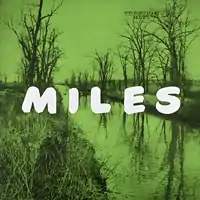Miles: The New Miles Davis Quintet
Miles: The New Miles Davis Quintet is an album by jazz musician Miles Davis released in April 1956 on Prestige Records, catalogue 7014.[1][2] It is the debut record by the Miles Davis Quintet, and generally known by the original title Miles as indicated on the cover.
| Miles | ||||
|---|---|---|---|---|
 | ||||
| Studio album by | ||||
| Released | April 1956[1][2] | |||
| Recorded | November 16, 1955 | |||
| Studio | Van Gelder Studio, Hackensack, New Jersey | |||
| Genre | Jazz | |||
| Length | 33:47 | |||
| Label | Prestige PRLP 7014 | |||
| Producer | Bob Weinstock | |||
| Miles Davis chronology | ||||
| ||||
| Review scores | |
|---|---|
| Source | Rating |
| Allmusic | |
| Billboard | |
| The Rolling Stone Jazz Record Guide | |
Background
In the summer of 1955, Davis performed a noted set at the Newport Jazz Festival, and had been approached by Columbia Records executive George Avakian, offering a contract with the label if he could form a regular band.[5] Davis assembled his first regular quintet to meet a commitment at the Café Bohemia in July. By September, the line-up stabilized to include John Coltrane on tenor saxophone, Red Garland on piano, Paul Chambers on bass, and Philly Joe Jones on drums.[6]
Still under contract to Prestige, an arrangement dating back to January 1951,[7] Davis convinced Avakian to buy out his contract with Prestige.[8] The terms of the deal between Avakian and Weinstock allowed Davis to record for Columbia but not release any of the material until Davis fulfilled his remaining duty to Prestige.[9] Davis took the quintet into the Columbia's studio first, on October 26, to record titles that would be issued on Round About Midnight.[10] Three weeks later the quintet entered the studio of Rudy Van Gelder in Hackensack, New Jersey, yielding the six titles for this album. During the following year, Davis and his quintet would record enough material over two Van Gelder sessions to yield Cookin', Relaxin', Workin', and Steamin' and fulfill their contractual obligation to Prestige.
Content
The songs were a mix of pop and jazz standards, items familiar enough to present few problems to the fledgling band, given the Prestige policy of offering no compensation for rehearsal time.[11] "The Theme" would continue to be Davis' standard set closer, and Coltrane does not play on "There Is No Greater Love."
Track listing
Side one
| No. | Title | Writer(s) | Length |
|---|---|---|---|
| 1. | "Just Squeeze Me" | Duke Ellington, Lee Gaines | 7:27 |
| 2. | "There Is No Greater Love" | Isham Jones, Marty Symes | 5:19 |
| 3. | "How Am I to Know?" | Dorothy Parker, Jack King | 4:39 |
Side two
| No. | Title | Writer(s) | Length |
|---|---|---|---|
| 1. | "S'posin'" | Paul Denniker, Andy Razaf | 5:15 |
| 2. | "The Theme" | Miles Davis | 5:49 |
| 3. | "Stablemates" | Benny Golson | 5:18 |
Personnel
See also
Albums recorded by the same personnel:
- 'Round About Midnight (1957)
- Cookin' (1957)
- Relaxin' (1958)
- Workin' (1960)
- Steamin' (1961)
References
- DeVito, Chris; Fujioka, Yasuhiro; Schmaler, Wolf; Wild, David (2013). Porter, Lewis (ed.). The John Coltrane Reference. New York/Abingdon: Routledge. p. 417. ISBN 9780415634632. Retrieved 2 January 2020.
- Editorial Staff, Billboard (5 May 1956). "The New Miles Davis Quintet". The Billboard. Cincinnati: The Billboard Publishing Co. Retrieved 27 April 2016.
- Yanow, Scott (2011). "The New Miles Davis Quintet – Miles Davis Quintet | AllMusic". allmusic.com. Retrieved 2 August 2011.
- Swenson, J., ed. (1985). The Rolling Stone Jazz Record Guide. USA: Random House/Rolling Stone. p. 58. ISBN 0-394-72643-X.
- Richard Cook. It's About That Time: Miles Davis On and Off Record. New York: Oxford University Press, 2005. ISBN 978-0-19-532266-8, pp. 44-45.
- Cook, p. 45.
- Cook, p. 25.
- Farah Jasmine Griffin and Salim Washington. Clawing at the Limits of Cool: Miles Davis, John Coltrane, and the Greatest Jazz Collaboration Ever. New York: Thomas Dunne Books, 2008. ISBN 978-0-312-32785-9, p. 86.
- Cook, p. 47.
- Jazzdisco.org Miles Davis retrieved 10 August 2011.
- Griffin and Washington, p. 160.